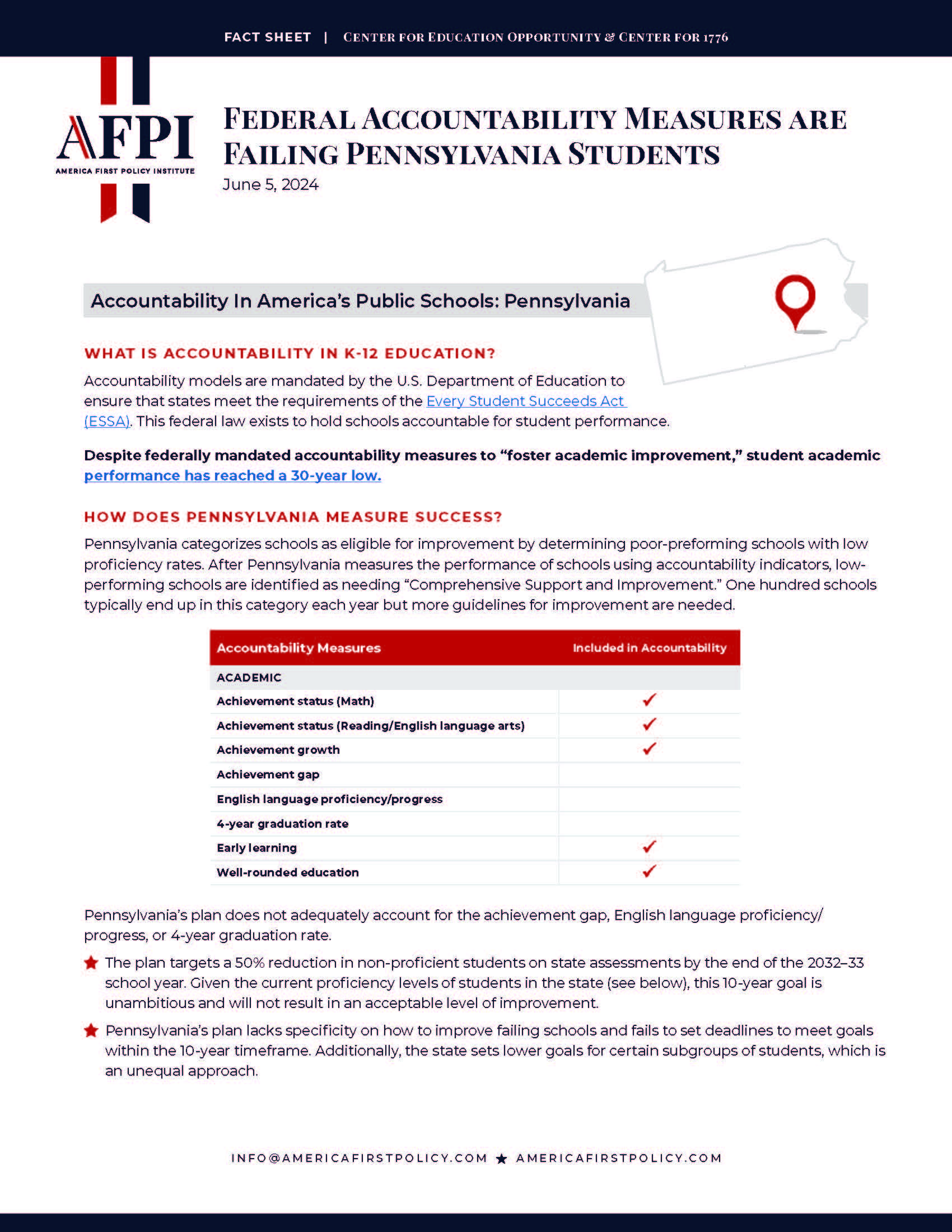Federal Accountability Measures are Failing Pennsylvania Students
Accountability In America’s Public Schools: Pennsylvania
WHAT IS ACCOUNTABILITY IN K-12 EDUCATION?
Accountability models are mandated by the U.S. Department of Education to ensure that states meet the requirements of the Every Student Succeeds Act (ESSA). This federal law exists to hold schools accountable for student performance.
Despite federally mandated accountability measures to “foster academic improvement,” student academic performance has reached a 30-year low.
HOW DOES PENNSYLVANIA MEASURE SUCCESS?
Pennsylvania categorizes schools as eligible for improvement by determining poor-preforming schools with low proficiency rates. After Pennsylvania measures the performance of schools using accountability indicators, lowperforming schools are identified as needing “Comprehensive Support and Improvement.” One hundred schools typically end up in this category each year but more guidelines for improvement are needed.
Accountability Measures | Included in Accountability |
ACADEMIC | |
Achievement status (Math) | x |
Achievement status (Reading/English language arts) | X |
Achievement growth | X |
Achievement gap | |
English language proficiency/progress | |
4-year graduation rate | |
Early learning | X |
Well-rounded education | X |
Pennsylvania’s plan does not adequately account for the achievement gap, English language proficiency/ progress, or 4-year graduation rate.
- The plan targets a 50% reduction in non-proficient students on state assessments by the end of the 2032–33 school year. Given the current proficiency levels of students in the state (see below), this 10-year goal is unambitious and will not result in an acceptable level of improvement.
- Pennsylvania’s plan lacks specificity on how to improve failing schools and fails to set deadlines to meet goals within the 10-year timeframe. Additionally, the state sets lower goals for certain subgroups of students, which is an unequal approach.
THE NATIONAL ASSESSMENT OF EDUCATIONAL PROGRESS (NAEP), THE LARGEST NATIONAL ASSESSMENT, IS THE GOLD STANDARD FOR REPORTING OUR NATION’S EDUCATIONAL PROGRESS. WHAT DO THE LATEST NAEP RATINGS SHOW ABOUT THE EFFECTIVENESS OF PENNSYLVANIA’S ESSA PLAN?
- In 2022, according to the National Assessment of Education Progress (NAEP) in Pennsylvania:
- The reading level of Pennsylvania students who performed at or above the NAEP Proficient in was only 34%
- Hispanic 4th grade students had an average reading score that was 23 points lower than that for White students.
- Low-income 4th grade students had an average reading score that was 31 points lower than that for students from middle and high income families.
- In 2022, Black students had an average score that was 32 points lower than that for White students.
RESTORING EDUCATION EXCELLENCE IN PENNSYLVANIA: TWO VITAL ACTIONS ARE NEEDED: HEIGHTENED TRANSPARENCY AND SHARPENED ACCOUNTABILITY.
- Congress and the state must reexamine their enforcement of federal accountability mandates for monitoring student performance, providing crucial data to assess the damage and guide effective interventions.
- State assessment systems must modernize, and tests should reflect current curricula. Pennsylvania’s model should deliver timely, actionable data regarding student progress and school performance to educators and parents.
- Accountability measures should be designed and implemented at the state level. A one-size-fits-all federal accountability model is counterproductive.
- To promote accountability and increase transparency, Pennsylvania should:
- Increase parental involvement by upholding federal laws that ensure parents the right to observe the activities being performed in the classroom and access to any survey materials about their children (20 U.S.C. § 6318; 20 U.S.C § 1232h).
- Train elected school board members to review curriculum and ensure that students have access to evidence-based curricula that positively affect student outcomes over time.
- Install video cameras in classrooms to record class sessions, track student progress, monitor curriculum implementation, and increase safety.
- Abolish teacher tenure in K–12 education, which currently does not require proof or performance metrics, leading to lower rates of teacher performance.
